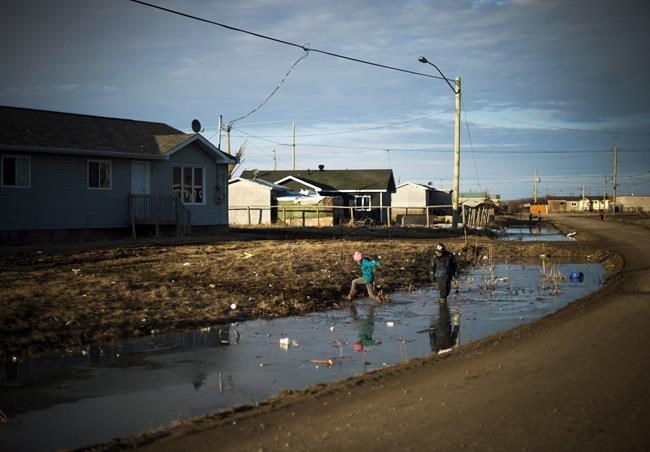OTTAWA — Prime Minister Justin Trudeau says his government will reveal today whether it will continue fighting an order directing it to compensate First Nations children removed from their homes.
Speaking while on a trip to the Netherlands ahead of international summits, he says ministers are working this morning in Ottawa to meet a deadline to decide whether to appeal the Federal Court ruling that upheld two historic decisions from the Canadian Human Rights Tribunal.
The tribunal found Ottawa discriminated against First Nations children by knowingly underfunding child and family services for those living on reserve.
Litigants in the case say this led to thousands of kids being taken away from their families and enduring abuse and suffering in provincial foster care systems.
The tribunal said each First Nations child, along with their parents or grandparents, who were separated because of this chronic underfunding were eligible to receive $40,000 each in federal compensation.
It also ruled that the criteria needed to be expanded so more First Nations children could be eligible for Jordan's Principle, a rule designed to ensure jurisdictional disputes over who pays for what doesn't prevent kids from accessing government services.
In 2019, the federal government asked the Federal Court to dismiss the tribunal's decisions, but the court last month upheld them.
Since then, pressure has been mounting from opposition parties and Indigenous leaders on Prime Minister Justin Trudeau to accept the ruling, rather than take it to the Federal Court of Appeal.
Trudeau says an announcement will be made later today and underscored his government is committed to compensating First Nations people who were harmed by child welfare systems.
"We are committed to working with partners to end this harmful system and to make sure that kids at-risk get to stay in their communities, in their culture, and be cared for by their communities," he said.
Figuring out what to do next has been one of the first major decisions his re-elected Liberal government and newly named cabinet ministers have had to grapple with.
Trudeau, along with his freshly appointed Indigenous services minister, Patty Hajdu, said earlier this week the case was being reviewed thoroughly and underscored that First Nations children would be compensated.
Despite that, neither directly ruled out seeking another court review, with Justice Minister David Lametti later saying there are different factors at play and that the file is a complicated one.
Child-welfare advocates and case litigants say if the Trudeau government is serious about its commitment to reconciliation with Indigenous People it won't go back to court.
Repairing Canada's relationship with Indigenous communities has long been a priority of Trudeau's, but the discovery of what are believed to be hundreds of unmarked graves at former residential school sites by First Nations in Saskatchewan and British Columbia have heightened Canadians' attention to his promise.
Trudeau has been under even more pressure to prove his commitment to reconciliation after choosing to spend the first national Truth and Reconcilation Day last month on vacation in Tofino, B.C., rather than attend a ceremony commemorating unmarked graves found at the former Kamloops residential school site. He has since visited the site and apologized profusely to the Tk'emlúps te Secwépemc, which had issued an invitation for him to attend the Sept. 30 ceremony.
This report by The Canadian Press was first published Oct. 29, 2021
Stephanie Taylor, The Canadian Press



